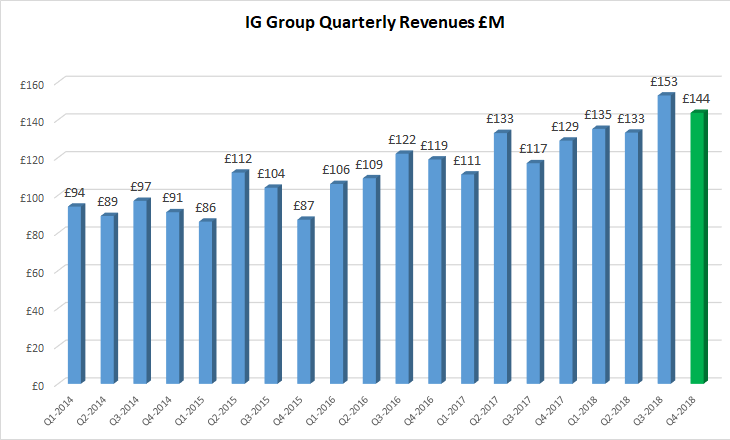UK online trading broker IG Group Holdings plc (LON:IGG) has reported its preliminary financial results in a trading update for the fiscal 2018 year (IG has a May 31 financial year end), indicating what are undoubtedly mixed results and outlook for the company.
As far as back-looking results, IG reported its second best ever quarter Revenue-wise, with Q4-2018 Revenue (for the March-May 2018 three month period) coming in at £144 million (USD $193 million). That’s actually down 6% from IG’s record Q3 (December 2017-February 2018) in which it brought in £153 million, driven by a surge in cryptocurrency trading by clients at the end of calendar 2017 and into early 2018, but a very good result nonetheless.
IG Group shares reacted positively to the news, trading up slightly (by 1.4%) in early Wednesday trading on the London Stock Exchange.
IG’s Operating Profit before taxes of £175 million for the second half of fiscal 2018 was 28% above the first half of the year.
Again, very good results.
However IG pointed out that the new ESMA restrictions on Forex and CFD brokers – most notably capping leverage at 30x for major FX pairs, at just 2x for cryptocurrency-related pairs, and somewhere in between for stock indices, commodities and other CFD instruments – would likely mean a 10% across the board hit to Revenues.
As the ESMA rules are expected to come into force across the EU during the first half of IG’s fiscal 2019, IG stated that it expects that its revenue in FY19 will be lower than that expected for FY18, reflecting the impact of the regulatory changes in the UK and EU. However – barring any other unforeseen regulatory changes – IG expects to return to growth after FY19.
IG also announced the addition of two of its senior executives to the company’s Board of Directors, Bridget Messer and Jon Noble, with effect from June 1, 2018.
Bridget Messer was appointed to her current role as Chief Commercial Officer in September 2015 and is responsible for the Group’s strategy for attracting prospects to IG, and managing and developing IG’s client relationships. Bridget first joined IG in 2005 as Legal Counsel and for the first 10 years at IG she undertook a number of roles including General Counsel, Head of Compliance and Company Secretary.
Jon Noble was appointed Chief Information Officer in 2012 and as such has been responsible for setting and delivering the Group’s IT strategy and for the stability and security of IG’s technology. Jon has been with IG throughout his career having first joined IG in 2000 as a graduate trainee, rising to Dealing and Operations Director by 2010.
Back to the figures released by IG…. overall for FY2018, Revenue for the full year is expected to be around £565 million, or 15% above FY17’s £491 million. The company’s operating expenses for FY18, excluding variable remuneration, are expected to be around £254 million, basically the same despite the rise in Revenue to FY17’s £253 million.
In part mitigating the impact of the aforementioned ESMA rules governing services offered to Retail customers, IG stated that it has received around 15,000 applications since November 2017 from clients to elect to be categorized as professional, and 3,800 clients are now categorized as professional. The process for assessing these applications is appropriately rigorous and over three-quarters of the applicants to date have been rejected. Clients categorized as professional contributed over 35% of UK and EU OTC leveraged revenue in the last three months, and the company continues to expect this proportion to rise to 50% when the ESMA measures come into effect.
Outside of the regulatory rule effects, IG stated that macro trends will continue to fuel business growth. The company expects to benefit from its US subsidiary serving the OTC FX market, which is planned to go live by the end of the first half of FY19, from the MTF in Europe that is expected to be live for FY20, and from acquiring licences to operate in jurisdictions in selected emerging markets that fit our strict criteria.
The Group intends to continue to invest to broaden the business’s product offering and to reinforce its competitive advantage. Operating expenses excluding variable remuneration are expected to increase in FY19 reflecting the company’s continued investment in product and platform development and additional headcount in sales and client service. Total operating costs (operating expenses plus variable remuneration) in FY19 are expected to be at a similar level to the £290 million total operating costs in FY18, reflecting a lower expected charge for variable remuneration.
A number of large technology firms are taking action on inappropriate advertising and marketing, and on unlicensed operators in the industry. These actions include introducing bans on the advertising and marketing of cryptocurrencies and binary options, and the requirement that firms advertising and marketing CFDs can demonstrate that they are appropriately licensed in those jurisdictions in which the services are being promoted. The company also expects that some of the large payment and card providers will soon introduce rules to ensure that these businesses only facilitate payments from and to clients in jurisdictions in which the firms are appropriately licensed.
IG said that it has delivered a sustainable business by placing good client outcomes at the heart of everything it does. As a compliant provider of its services, and with a model of operating through local presence with local regulatory approvals, the company does not expect that the actions currently being taken, if applied appropriately, will have any significant impact on its business.
